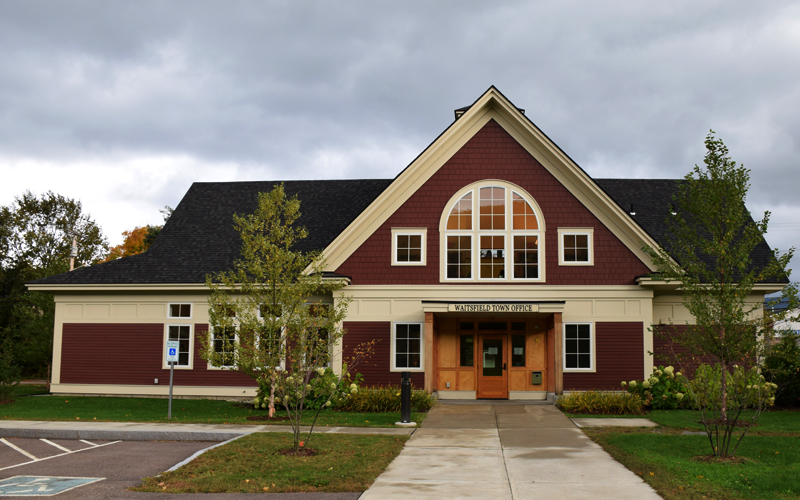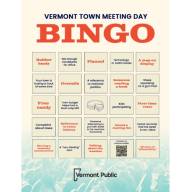After two meetings with members of the Mad River Valley Housing Coalition to discuss a coalition request for a portion of Waitsfield’s ARPA funds, the Waitsfield Select Board was not ready to commit this week.
That was the same story when the housing coalition board members met with the Fayston Select Board last week. Select board members in both towns want to wait until they can meet jointly with Warren to discuss the housing coalition’s request. The coalition has asked for about 10% of each town’s ARPA funds: $42,500 from Fayston, $54,100 from Waitsfield and $53,400 from Warren. The funds would pay for an executive director for the housing coalition for two years.
Karl Klein, chair of the housing coalition’s board, said this week’s meeting with the select board was frustrating.
“If Waitsfield or any town wanted to go it alone on housing they could. But they don’t. The minute we leave the room they don’t talk about housing. I just don’t get it. The towns seem to lack the political will do this,” Klein said.
He reiterated a position taken by the housing coalition last fall, arguing that the issue of housing should really fall under the umbrella of the tri-town Mad River Valley Planning District. The planning district’s steering committee declined the request.
“Last fall they told us this was too rushed. Now we’re back before the towns asking them to tell us what they want to do, asking us how to move forward on housing. Without town support, our efforts are meaningless,” Klein said.
DISCUSSED CONCERNS
At the Waitsfield Select Board’s April 11 meeting, board members discussed concerns and some reservations about the proposal. Board member Brian Shupe said he thinks using ARPA funds for housing is potentially appropriate, but he expressed reservations about some of the goals identified by the housing coalition for an executive director to address in the next two years.
“I’m not seeing this as being, as Karl said, as intended to be transformative. Is a temporary staff person transformative?” Shupe asked.
Board member Jordan Gonda said she supported the work and mission of the housing coalition and was open to exploring ways to assist it in terms of staffing an executive director.
‘DUE DILIGENCE’
“But I want to make sure we take our time and do it thoughtfully and engage the public. Not that I think it’s a bad idea, but I need more due diligence,” Gonda said.
Board member Chach Curtis asked about funding that the planning district member towns paid for a housing report that came out in 2019 and whether that funding was permanent. Housing coalition board member Mac Rood said that was a separate one-time request for funding and he too reiterated the coalition’s position that the issue of housing appropriately belongs under the umbrella of the planning district.
“At the time, the planning district felt it was too much to take on and asked us to come to each select board,” Rood said.
Board chair Christine Sullivan, who is one of Waitsfield reps on the steering committee, said that the planning district’s work plan calls for 10-13% of staff work to be on housing.
“Either through the planning district or the coalition, we’re not going to tackle this problem until there is somebody on staff who is dedicated to solving the housing problem,” Rood pointed out.
Board members had specific questions for Michelle Leibowitz, the current, part-time executive director of the housing coalition and she provided a run down of what could be priorities if the towns commit to funding her position. Leibowitz has extensive experience in working on housing with private developers as well as state government and at the legislative level.
FIRST STEPS
Leibowitz said there were several first steps such as looking at what housing is not being used most efficiently and how advocating for it to be used more efficiently. She noted that Sugarbush has plans to build workforce housing and noted that that would be a faster process and would take some of the pressure off the rest of The Valley. But she cautioned that facilitating building is more than a two-year process and said that getting developers interested and incentivized was likely a two-year process. Finally, she pointed out that it’s much faster to find private money than it is to obtain public funds.
“At the end of two years, I’d hope to have some type of rental program. A development breaking ground may take a lot longer than two years. My role could be lots of different things. But I can’t go talk to state or federal governments or developers without a mandate from the towns. If you’re not leveraging funds, you’re not leveraging housing,” she said.
Klein said that where housing is being addressed in Vermont it is where towns have taken action and dedicated money and professionals to it.
‘THE CHALLENGE’
“The challenge is that we have three towns and we need a professional who spends her time working on the issue. We went to the planning district first because we know this requires a three-town solution and the only place where the three select boards get together is the planning district. The solution needs to come from the government of the towns and without that I don’t think we can go forward,” Klein said.
“We can’t look and ask how many houses can we build in five years. We know there are opportunities coming in this Valley, land opportunities that are in play. The planning district is going to have to take this on,” he added.
“Are there likely projects coming our way? And what’s the best way to support that? A person? Infrastructure? The planning district has a full agenda. I think we need to have a summit to see how the other towns fee. Also, there’s significant legislation with investment for housing and planning coming from the state. Are there any grant funds available through those programs to support an executive director?” Shupe asked.
“Who would administer and seek those funds if we don’t have a person or organization that is dedicated to that?” Rood answers.
Shupe acknowledged that in communities with someone advocating for them, the squeaky wheel often got the grease.












